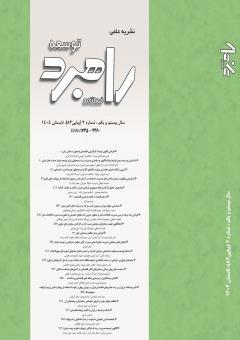نقش بستانکاران در بازسازی بنگاه های اقتصادی ورشکسته
محورهای موضوعی : اقتصادیپرستو یوسفی 1 , محسن امامي قشلاق 2 * , اصغر عربیان 3
1 - دانشجوي دوره دكتري تخصصي حقوق خصوصی،گروه حقوق خصوصی، دانشكده حقوق، الهيات و علوم سياسي، واحد علوم و تحقيقات،دانشگاه آزاد اسلامي،تهران، ايران
2 - استادیار و عضو هیأت علمی گروه حقوق واحد ارومیه،دانشگاه آزاد اسلامی،ارومیه،ایران.
3 - دانشیار،عضو هيأت علمي گروه حقوق خصوصی،دانشكده حقوق،الهيات وعلوم سياسي، واحد علوم وتحقيقات، دانشگاه آزاد اسلامي،تهران ، ايران.
کلید واژه: بستانکاران, بنگاه های اقتصادی, ورشکسته.,
چکیده مقاله :
قانون تجارت فعلی ایران اقتباسی از قاتون تجارت سال۱۸0۷م. کشور فرانسه است. علیرغم ملغی شدن این قانون در فرانسه، در حقوق ایران، هیچگونه قوانین ماهوی جدیدی در باب ورشکستگی از سال ۱۳۱۸ به بعد تدوین نشده است. از طرفی به لحاظ پیشرفت روزافزون فعالیتهای تجاری, تأسیسات حقوقی جدیدی نیز در سایر کشورها ایجاد شده که از جمله آَنها میتوان نهاد بازسازی را نام برد. بازسازی که مشتمل بر طرحی به نام طرح بازسازی است درخصوص اشخاص بدهکار اعم از تاجر یا غیرتاجرقابل تسری است. ایجاد نهاد بازسازی احتیاج به قبول اکثریت طلبکاران و تصدیق دادگاه داشته، با تصدیق طرح بازسازی توسط دادگاه، بدهکار بهعنوان بدهکار متصرف به فعالیت و کنترل بر اموال و دارایی خود ادامه میدهد و با طلیکارانش توافق میکند که در مواعد و مهلتهای تعیین شده مطالبات آنان را پرداخت کند. طرح بازسازی نسبت به خود بدهکار و طلبکاران دارای آثاری است. درقانون تجارت ۱۳۱۱ بازسازی به معنای اخص پیش بینی نشده است ولی در لایحه ی ٨٤ این خلاء پر شده است که البته در لایحه ی ۹۱ مجدداً از قواعد قانون فعلی تبعیت کرده است؛ با این تفاوت که قرار داد ارفاقی قبل از صدور حکم ورشکستگی منعقد می شود. پرسش اصلی این پایان نامه این است که بازسازی بنگاه های اقتصادی در حقوق ایران چگونه است؟ بطور کلی در حقوق ایران امر بازسازی به معنای اخص پیش بینی نشده است و حتی تصویب قوانینی مثل حمایت از صنایع و کمیسیون بحران اصل ۱۳۸ ق.ا این نقیصه را برطرف نکرده و همچنان این بخش از قانون تجارت نیاز به بررسی دارد.
The current Iranian Commercial Code is primarily derived from the French Commercial Code of 1807. Despite its abrogation in France and subsequent reforms in comparative jurisdictions, Iran has not enacted substantive legislative reforms in bankruptcy law since the promulgation of the 1932 Code. Meanwhile, the rapid expansion and complexity of commercial activities have necessitated the adoption of modern insolvency frameworks in other jurisdictions, most notably corporate restructuring regimes. Restructuring—implemented through a legally binding restructuring plan—applies to both commercial and non-commercial debtors. Its initiation requires approval by a qualified majority of creditors and subsequent confirmation by the court. Upon judicial confirmation, the debtor assumes the status of debtor-in-possession, retaining managerial control over assets and operations while negotiating repayment schedules with creditors within court-sanctioned deadlines. This plan generates binding obligations for both debtors and creditors, serving as a mechanism to preserve enterprise value while ensuring creditor satisfaction. In Iranian law, restructuring in its narrow technical sense remains absent from the 1932 Commercial Code. Although the 2005 Draft Bill introduced provisions to address this deficiency, the 2012 Draft Bill reverted largely to the existing legal framework, with the principal innovation being the recognition of preventive composition agreements (concordat préventif) prior to a formal bankruptcy declaration. The central inquiry of this study is thus: How does Iranian law conceptualize and regulate the restructuring of insolvent enterprises? It concludes that Iranian law lacks a coherent restructuring regime comparable to those adopted in advanced legal systems, and that even targeted legislative initiatives—such as the Law for the Protection of Industries and the Crisis Management Commission established under Article 138 of the Constitution—have failed to address this systemic gap. Accordingly, this area of Iranian commercial law demands comprehensive legislative reform, informed by comparative analysis and contemporary insolvency principles.
- عرفانی، محمود(1385). حقوق تجارت به زبان ساده، تهران، انتشارات میزان.
-کاویانی، کوروش(1391). حقوق ورشکستگی، چاپ اول، تهران، انتشارات میزان،.
- صادقی، محسن (1383). توجیه حقوقی قرارداد ارفاقی و پیمان دسته جمعی کار با توجه به اصل نسبی بودن اثر قراردادها، فصلنامه ي دیدگاههاي حقوقی قضایی ، 9(33-32): 84-55.
- صفری، محمد،(1386)، سیاست ها و راهکارهای لایحه راجع به بازسازی و ورشکستگی، نشریه وزارت بازرگانی، دفتر مطالعات اقتصادی.
- عبدی پور، ابراهیم،(1392)، «تحولات و ملاحظات حقوق ورشکستگی و بایسته های فقهی آن» دین و قانون، 1(1): 76-51.
-قنواتی، جلیل؛ کهنمویی، اسماعیل، (1389). بررسی نهاد بازسازي در قانون ایالات متحده و مقایسه آن با قرارداد ارفاقی، مجله ي پژوهش هاي حقوق تطبیقی، 14(1): 142-115.
- ورمزیار ارزانفودی، محمد،(1388)، «اداره موقت شرکتهای تجاری متوقف (مطالعه تطبیقی در حقوق انگلیس و ایران)»، رساله دکتری حقوق خصوصی دانشگاه تربیت مدرس، استاد راهنما: محمد عیسائی تفرشی.
Baird, D. G. (1998). Bankruptcy's uncontested axioms. Yale Law Journal, 108(4), 751–788. https://doi.org/10.2307/797377
Braucher, J. (1994). Bankruptcy reorganization and economic development. Capital University Law Review, 23(3), 499–518.
Jackson, T. H. (1986). Of liquidation, continuation, and delay: An analysis of bankruptcy policy and non-bankruptcy rules. American Bankruptcy Law Journal, 60(1), 5–34.

